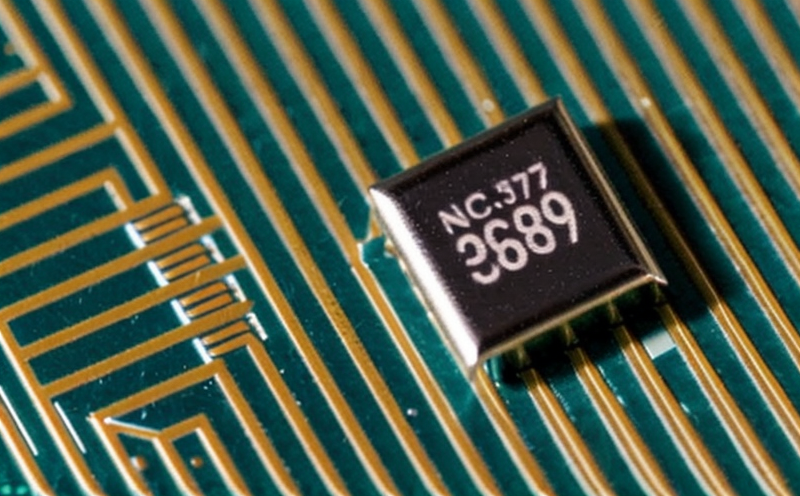JEDDEC JESD22-A117 Microchip IDDQ Characterization Testing
The JEDEC standard JESD22-A117 is a critical protocol used for characterizing the current consumption (IDDQ) of microchips. IDDQ testing is essential because it helps identify latent defects that could lead to failures in production or under real-world operating conditions. This testing method focuses on measuring the static power consumption of a chip, which can reveal issues such as shorts, opens, and other internal faults.
IDDQ testing is particularly important for semiconductor manufacturers who aim to ensure their products meet quality standards before they reach the market. By identifying defects early in the development process, companies can reduce costs associated with rework or scrap, enhance product reliability, and improve customer satisfaction. This service ensures that microchips undergo rigorous IDDQ characterization tests, which are aligned with international standards such as JEDEC JESD22-A117.
The testing process involves placing the chip under various environmental conditions to observe its behavior. The test typically includes applying different voltages and currents while monitoring for any discrepancies in power consumption. The data collected during these tests is then analyzed using specialized software tools designed specifically for semiconductor analysis. These tools help engineers interpret the results accurately, pinpointing potential issues that require further investigation or corrective action.
One of the key advantages of IDDQ testing is its ability to detect early-stage failures within a chip's circuitry. By identifying these faults at an earlier stage in the manufacturing process, companies can prevent them from becoming more severe problems later on. This proactive approach not only improves overall product quality but also enhances safety by ensuring that only reliable components are used in end products.
In addition to detecting internal defects, IDDQ testing provides valuable insights into how well a chip performs under different operating conditions. Understanding these performance characteristics is crucial for optimizing the design and improving the efficiency of microchips across various applications. For instance, this information can be used to enhance battery life in portable devices or increase processing speed in high-performance computing systems.
Compliance with industry standards like JEDEC JESD22-A117 ensures that manufacturers meet regulatory requirements while maintaining a competitive edge in the market. Meeting these standards builds trust among customers and stakeholders, fostering long-term relationships based on reliability and performance excellence.
Why It Matters
The significance of IDDQ testing cannot be overstated when it comes to ensuring the longevity and reliability of microchips in modern electronic devices. As technology continues to evolve, so too do our expectations for product performance and durability. Manufacturers must adhere strictly to rigorous testing protocols like JEDEC JESD22-A117 to guarantee that their products meet these high standards.
One major reason why this type of testing is crucial lies in its role as an early indicator of potential failures within a chip's internal structure. By catching issues during the development phase, companies can address them before they escalate into more significant problems down the line. This not only saves time and resources but also contributes to creating better products overall.
Another important aspect is the impact on customer satisfaction. When consumers purchase electronic devices containing high-quality microchips that have undergone thorough IDDQ testing, they are assured of receiving reliable performance without unexpected failures. This trust fosters positive brand perception and encourages repeat business as well as word-of-mouth referrals from satisfied customers.
Moreover, compliance with industry standards such as JEDEC JESD22-A117 is essential for maintaining regulatory adherence. Governments around the world have established strict regulations governing electronic waste management and product safety. By ensuring that all components used in their products comply with these rules, manufacturers demonstrate their commitment to environmental responsibility and public health.
Customer Impact and Satisfaction
The implementation of IDDQ testing according to the JEDEC JESD22-A117 standard has a profound positive impact on both customers and stakeholders. For end users, this means receiving products with enhanced reliability and durability, leading to fewer unexpected failures and longer-lasting devices.
Manufacturers benefit from reduced warranty claims due to early detection of defects during the production process. This results in lower costs associated with repairs or replacements, thereby improving profitability. Additionally, meeting strict quality control measures enhances brand reputation and builds long-term relationships based on trust and satisfaction.
From a regulatory standpoint, adherence to international standards like JEDEC JESD22-A117 ensures compliance with government regulations regarding product safety and environmental impact. This not only helps avoid potential legal issues but also contributes positively towards sustainable practices within the industry.
Use Cases and Application Examples
- Battery-Powered Devices: IDDQ testing is critical for optimizing battery life in portable electronics such as smartphones, tablets, wearables, etc. By identifying inefficiencies early on, manufacturers can make necessary adjustments to improve energy efficiency.
- High-Performance Computing Systems: In data centers and supercomputers where processing speed matters most, IDDQ testing ensures that chips operate efficiently without unnecessary power consumption, thereby enhancing overall system performance.
- Automotive Electronics: As automotive systems become increasingly complex, IDDQ testing plays a vital role in ensuring the reliability of microcontrollers used in various components like engine control units (ECUs), braking systems, etc., reducing the risk of failures that could compromise safety.
- Consumer Electronics: From smart TVs to gaming consoles, IDDQ testing helps maintain consistent performance across all devices, providing users with a seamless experience free from interruptions due to hardware issues.





